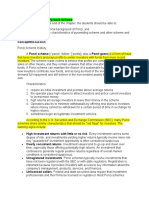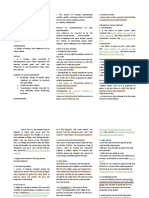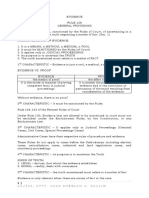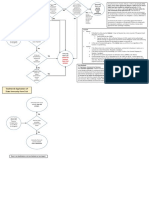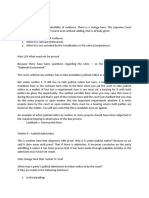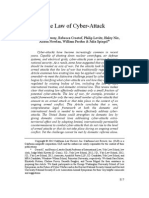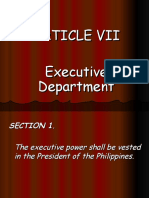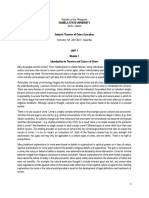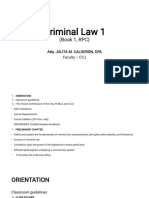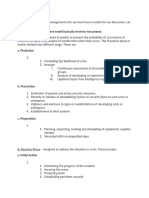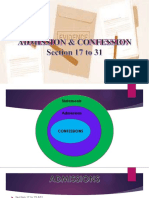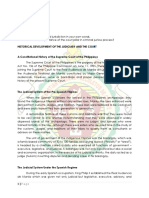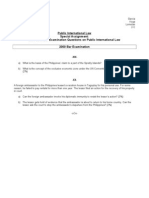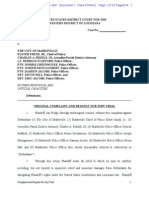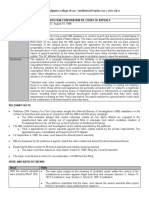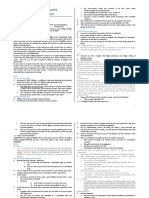MODULE 2
THE LAW ENFORCEMENT COMPONENT
Pre- module questions:
1. Name at least three (3) major law enforcement agency in the Philippines and
discuss the functions of those agencies.
2. Name and differentiate the two types of arrest according to the Revised Rules
of Court.
THE LAW ENFORCEMENT COMPONENT
Arrest by Virtue of Warrant
When a warrant is issued by a judge, the warrant is delivered to the proper law
enforcement agency for execution. The head of the office to whom the warrant of arrest
was delivered shall cause the warrant to be executed within ten (10) days from its receipt.
Within 10 days after the expiration of the period, the officer to whom it was assigned for
execution shall make a report to the judge who issued the warrant. In case of failure to
serve the warrant, he shall state the reason for its non-execution. (Sec. 4, Rule 113, Rules
of Court)
Arrest, as defined under Sec. 1, Rule 113 of the Rules of Criminal Procedure, is the
taking of a person into custody in order that he may be bound to answer for the
commission of an offense. Arrest can be with warrant or without warrant.
The purpose of arrest is for the court to have jurisdiction over the person of the
accused for a specific and definite purpose of making him answer for the commission of
an offense. The court cannot try unless the elements of jurisdiction are compiled.
Section 2, Rule 113 of the Revised Rules on Criminal Procedure provides for the
manner, time, and conduct of arresting a person who committed a crime. It states that:
Section 2. Arrest; how made. – An arrest is made by an actual restraint of a person to be
arrested, or by his submission to the custody of the person making the arrest.
No violence or unnecessary force shall be used in making an arrest. The person
arrested shall not be subject to a greater restraint than is necessary for his detention.
(Luz v. People, 667 SCRA 421, 429-430 and Pestillos v. Generoso, G.R. no. 182601,
November 10, 2014)
1|Page
� The above jurisprudence provides that actual force, manual touching of the
body, or physical restraint nor a formal declaration of arrest is neither required for arrest
to exist. It is enough that there is an intention on the part of one of the parties to arrest
the other, and that there is an intent on the part of the other to submit, under the belief
and impression that submission is necessary.
In case of a motorist that is flagged down for a traffic violation, he is not deemed
to be “under arrest” at the time that he was waiting for the traffic officer to write the
citation ticket. The period before the issuance of citation ticket is characterized merely
as “waiting time” provided that there is no intent on the part of the officer to take the
motorist into custody. (Luz v. People, 667 SCRA 421, 433)
When making an arrest by virtue of a warrant, the officer shall inform the person
to be arrested of: (Section 7, Rule 113 of the Revised Rules on Criminal Procedure)
a) The cause of his arrest;
b) The officer shall inform the person to be arrested of the cause of arrest; and
c) The fact that a warrant has been issued for his arrest.
Exceptions:
When the person to be arrested flees or forcibly resists before the officer has the
opportunity to so inform him, or when the giving of such information will imperil the arrest.
In the arrest, take note that the officer need not have the warrant in his possession
at the time of the arrest, if the person arrested so requires, the warrant shall be shown to
him as soon as practicable. (Section 7, Rule 113 of the Revised Rules on Criminal
Procedure)
Legal Duties of an Arresting Officer by Virtue of Warrant of Arrest
1) to inform him of the reason for the arrest;
2) to show him the warrant of arrest, if any;
3) to inform him of his constitutional rights to remain silent and to counsel, that he
is entitled to exercise such rights, and that any statement he might make or
declare can be used against him in a court of law;
4) to inform him of his constitutional right to communicate with his counsel, a
relative or anyone he chooses by the most expedient means – by telephone if
possible, or by letter or messenger – who can assist him while under arrest and
detention;
5) it shall be the responsibility of the arresting officer to see to it that the foregoing
is accomplished (Morales, Jr. v. Enrile, 121 SCRA 538, People v. Galit, 135 SCRA
465, et al.); and
2|Page
� 6) to deliver him to the nearest police station or jail (Sec. 3, Rule 113, Rules on
Criminal Procedure)
Time of Making an Arrest
Section 6, Rule 113 of the Revised Rules on Criminal Procedure
Time of making arrest. An arrest may be made on any day and at any time of the day
and night.
Arrest without Warrant
Section 5, Rule 113 of the Revised Rules on Criminal Procedure
Section 5. Arrest without warrant; when lawful.
- A peace officer or a private person may, without a warrant, arrest a person:
a. When, in his presence, the person to be arrested has committed, is actually
committing, or is attempting to commit an offense; (in flagrante delicto)
b. When an offense has just been committed and he has probable cause to
believe, based on personal knowledge of facts or circumstances, that the
person to be arrested has committed it; (hot pursuit) and
c. When the person to be arrested is a prisoner who has escaped from a penal
establishment or place where he is serving final judgment or is temporarily
confined while his case is pending, or has escaped while being transferred
from one confinement to another. (arrest of an escapee)
In cases falling under paragraph (a) and (b) above, the person arrested without
a warrant shall be forthwith delivered to the nearest police station or jail and shall be
proceeded against in accordance with Section 7 Rule 112.
For a warrantless arrest of an accused caught in flagrante delicto to be valid, two
(2) requisites must concur:
1. The person to be arrested must execute an overt act indicating that he has just
committed or is actually committing, or
2. Such overt act is done in the presence or within the view of the arresting officer.
For paragraph (b) of Section 5, personal knowledge must not be influenced by
the past criminal record. It must be that the offender had just committed the crime. That
the person is in hot pursuit as contemplated in the second paragraph.
3|Page
� Buy-bust operation or entrapment is an example of warrantless arrest through “in
flagrante delicto.”
Instigation - takes place when a police officer induces a person to commit a
crime; without if the crime would not be committed.
Entrapment – signifies the ways and means devised by a peace officer to catch
or apprehend a person who has committed a crime; with or without if the crime has
already been committed.
Method of Arrest Without Warrant; Duty of the Arresting Officer; Exception
Section 8. Method of arrest by officer without warrant. – When making an arrest
without a warrant, the officer shall inform the person to be arrested of his authority and
the cause of the arrest, unless the latter is either engaged in the commission of an offense,
is pursued immediately after its commission, has escaped, flees, forcibly resists before the
officer has opportunity to so inform him, or when the giving of such information will imperil
the arrest.
Note:
• Warrantless arrest is also known as Citizen’s arrest. With that note, any citizen could
also affect arrest.
• Instigation can be used as a defense on a criminal case
Assistance to Effect Arrest
Section 10, Rule 113 of the Revised Rules on Criminal Procedure provides for the
rule on assistance in making the arrest.
Section 10. Officer may summon assistance. – An officer making a lawful arrest
may orally summon as many persons as he deems necessary to assist him in effecting the
arrest. Every person so summoned by an officer shall assist him in effecting the arrest when
he can render such assistance without detriment to himself.
LAW ENFORCEMENT AGENCIES
The first pillar of the Philippine Criminal Justice System stands at the forefront and is the
prime mover of the justice system. The Law Enforcement has the following goals:
1. Crime Prevention
2. Arrest or Criminal Apprehension
3. Criminal Investigation
4|Page
� 4. Order Maintenance
5. Public Service
Philippine National Police (PNP)
The PNP was created by virtue of RA 6975. It was approved on December 13, 1990
and effective on January 1, 1991. The law was further amended by RA 8551 and RA 9708.
The two (2) latter laws only amended certain provisions of Philippine National Police.
Section 1. Title of the Act. – This Act shall be known as the “Department of the
Interior and Local Government Act of 1990.”
Section 23. Composition. – Subject to the limitations provided for in this Act, the
Philippine National Police, hereinafter referred to as the PNP, is hereby established, initially
consisting of the members of the police forces who were integrated into the Integrated
National Police (INP) pursuant to Presidential Decree No. 765, and the officers and
enlisted personnel of the Philippine Constabulary (PC). For purposes of this Act, the
officers and enlisted personnel of the PC shall include those assigned with the Narcotics
Command (NARCOM) or the Criminal Investigation Service (CIS); and those of the
technical services of the AFP assigned with the PC and the civilian operatives of the CIS.
The regular operatives of the abolished NAPOLCOM Inspection, Investigation and
Intelligence Branch may also be absorbed by the PNP. In addition, PC officer or enlisted
personnel may transfer to any of the branches or services of the Armed Forces of the
Philippines in accordance with the provisions of Section 85 of this Act.
The PNP powers and functions:
(a) Enforce all laws and ordinances relative to the protection of lives and
properties;
(b) Maintain peace and order and take all necessary steps to ensure public safety;
(c) Investigate and prevent crimes, effect the arrest of criminal offenders, bring
offenders to justice, and assist in their prosecution;
(d) Exercise the general powers to make arrest, search, and seizure in accordance
with the Constitution and pertinent laws;
(e) Detain an arrested person for a period not beyond what is prescribed by law,
informing the person so detained of all his rights under the Constitution;
(f) Issue licenses for the possession of firearms and explosives in accordance with
law;
5|Page
� (g) Supervise and control the training and operations of security agencies and
issue licenses to operate security agencies, and to security guards and private
detectives, for the practice of their professions; and
(h) Perform such other duties and exercise all other functions as may be provided
by law.
Question: In times of insurgency, what is the function of the Philippine National Police?
Answer: Section 3. Section 12 of Republic Act No. 6975 is hereby amended to read as
follows:
Section 12. Relationship of the Department (DILG) with the Department of National
Defense.
The Philippine National Police shall, through information gathering and
performance of its ordinary police functions, support the Armed Forces of the Philippines
on matters involving suppression of insurgency, except in cases where the President shall
call on the PNP to support the AFP in combat operations.
Rank Classification and Key Positions
Section 28. Rank Classification. – For purposes of efficient administration,
supervision and control, the rank classification of the members of the PNP shall be as
follows:
Director General
Deputy Director General
Director
Chief Superintendent
Senior Superintendent
Superintendent
Chief Inspector
Senior Inspector
Inspector
Senior Police Officer IV
Senior Police Officer III
Senior Police Officer II
6|Page
� Senior Police Officer I
Police Officer III
Police Officer II
Police Officer I
By virtue of RA 11200, approved on February 8, 2019, the rank classification has
been changed to the following:
Section 1. Section 28 of Republic Act No. 6975, otherwise known as the
“Department of the Interior and Local Government Act of 1990,” is hereby amended to
read as follows:
Section 28. Rank Classification. – For purposes of clarity of command and
responsibility, and for the effective and efficient administration, supervision and control,
the rank classification of the uniformed personnel of the PNP shall as follows:
Police General
Police Lieutenant General
Police Major General
Police Brigadier General
Police Colonel
Police Lieutenant Colonel
Police Major
Police Captain
Police Lieutenant
Police Executive Master Sergeant
Police Chief Master Sergeant
Police Senior Master Sergeant
Police Master Sergeant
Police Staff Sergeant
Police Corporal
Patrolman/Patrolwoman
Section 2, RA 11200. The remaining provisions of Republic Act No. 6975, as
amended by Republic Act No. 8551, otherwise known as the “Philippine National Police
Reform and Reorganization Act of 1998,” that have reference to the rank classification
7|Page
�of the uniformed personnel of the Philippine National Police, and all other laws, executive
orders, rules, and regulations inconsistent with the provision of this Act shall be deemed
modified or repealed accordingly.
The National Bureau of Investigation
The National Bureau of Investigation is a highly trained investigative body that is
functionally integrated and national in scope. This was created under RA 157 and
Reorganized and Modernized under RA 10867. NBI is under the Department of Justice
(DOJ), headed by a director that is appointed by the President with the rank, salary, and
privileges that of Undersecretary. he is assisted by two (2) Deputy Directors, one for
Administration and another for Operations. And an Assistant Director for each of the
following seven Services: Investigation Service, Intelligence Service, Human Resource
and Management Service, comptroller service, and Information Communications
Technology Service.
The National Bureau of Investigation has the following powers and functions:
a) Undertake investigation and detection of crimes and offenses enumerated
under Section 5 hereof;
b) Issue subpoena for the appearance of any person for investigation or
production of documents, through its officers from the ranks of Regional
Director to Director;
c) Act as national clearing house of criminal records and other related
information for the benefit of the government;
d) Render technical assistance to government agencies and instrumentalities,
when so requested;
e) Extend assistance in cases involving extradition and mutual legal assistance,
when requested by the Department of Justice;
f) Establish an NBI Academy which shall be responsible for the recruitment,
training, and development of all NBI agents and personnel, among others;
g) Establish and maintain a Forensic and Scientific Research Center which shall
serve as the primary center for forensic and scientific research in furtherance
of scientific knowledge in criminal investigation, detection, evidence
collection and preservation, and provide the necessary training therefor;
8|Page
� h) Establish and maintain a Cyber Investigation and Assessment Center which
shall serve as the nerve center for computer information technologies, data on
cybercrime cases, computer intrusion, threats, and other related crimes or
activities;
i) Establish and maintain an integrated, comprehensive, and state-of-the-art
network of equipment and facilities to be used by the NBI in its criminal
investigation, detection, and evidence gathering, and to provide the
corresponding training in this regard;
j) Request the assistance of the Philippine National Police (PNP), Armed Forces
of the Philippines, or any other agency of the government, including
government-owned and/or controlled corporations, in its anti-crime drive.
Such assistance may include the use of the agency’s personnel and facilities
upon prior approval by the head of the agency concerned;
k) Conduct intelligence operations in furtherance of the foregoing powers and
functions;
l) Enter into any contract or transaction for the acquisition, ownership, possession,
administration, lease, disposition or acceptance of real or personal property in
its name, subject to the approval of the Secretary of Justice;
m) Establish a modern NBI Clearance and Identification Center containing all
derogatory and criminal records and civilian identification records, including
their identifying marks and characteristics and fingerprint database, as well as
dental records pursuant to Presidential Decree No. 1575, entitled “Requiring
Practitioners of Dentistry to Keep Records of their Patients”;
n) Maintain, for purposes of investigative and forensic requirements of the NBI,
relevant database such as ballistic records of firearms including, but not limited
to, data ownership, possession, and other related identifying circumstances,
and Deoxyribonucleic Acid (DNA) databank; and
o) Perform such other functions as the President or the Secretary of Justice may
assign.
The NBI shall have primary jurisdiction to undertake investigations in the following
cases:
a) Human Trafficking cases in all airports in the Philippines;
b) Extrajudicial/Extra-legal killings committed by the state’s security forces against
media practitioners and activists;
9|Page
� c) Killings of justices and judges;
d) Violation of Republic Act No. 10175, otherwise known as the “Cybercrime
Prevention Act”;
e) Cases referred by the Inter-Agency Anti-Graft Coordinating Council (IAGCC);
f) Violations of the Anti-Dummy Law;
g) Cases involving threats to security or assaults against the persons of the
President, Vice President, Senate President, Speaker of the House
Representatives, and Chief Justice of the Supreme Court;
h) Transnational crimes pursuant to existing international agreements;
i) Identification of the dead/victims in case of mass fatality incidents caused by
natural disasters; and
j) Violations of commercial, economic, and financial or white-collar crimes such
as, but not limited to, those punishable under Republic Act No. 8792, otherwise
known as “E-Commerce Act of 2000; Republic Act No. 8484, otherwise known
as “Access Devices Regulations Act of 1998”; Republic Act No. 8293, otherwise
known as “Intellectual Property Code of the Philippines’; Republic Act No.
8799, otherwise known as “Securities Regulation Code”; Presidential Decree
No. 1689, otherwise known as “Decree Increasing the Penalty for Certain Forms
of Estafa,” and other similar penal statutes that may be enacted by Congress.
Provided, however, that the President or the Secretary of Justice may direct the
NBI to undertake the investigation of any crime when public interest so requires.
Once the NBI takes cognizance of any of the aforementioned cases, the PHP and
other law enforcement agencies/investigative entities shall collaborate with and render
assistance to the NBI. In cases where jurisdiction is vested exclusively and/or primarily with
the PNP or other law enforcement agency/investigating agency, the NBI shall
collaborate with and render assistance to the same.
Philippine Coast Guard
The Philippine Coast Guard is the country’s vanguard against the entry of unsafe
foreign vessels into the country through its Port State Control (PSC). This agency is an
armed and uniformed service attached to the Department of Transportation and
Communications (DOTC). Provided, that in times of war, as declared by Congress, the
PCG or parts thereof, shall be attached to the Department of National Defense. At
10 | P a g e
�present, the Philippine Coast Guard has seven (7) PSC Centers and fifteen (15) PSC
Divisions all throughout the archipelago. The PSC Center in Manila has the bulk of all
inspections based on frequency of foreign ship calls.
Philippine Coast Guard was originally created by RA 5173. The latter law was
repealed by RA 9993, also known as “Philippine Coast Guard Law of 2009”.
Section 3. Powers and Functions. – The PCG shall have the following powers and
functions:
a) To enforce regulations in accordance with all relevant maritime international
conventions, treaties or instruments and national laws for the promotion of
safety of life and property at sea within the maritime jurisdiction of the
Philippines and conduct port state control implementations;
b) To conduct inspections on all merchant ships and vessels, including but shall
not be limited to inspections prior to departure, to ensure and enforce
compliance with safety standards, rules, and regulations;
c) To detain, stop or prevent a ship or vessel which does not comply with safety
standards, rules, and regulations from sailing or leaving port;
d) To conduct emergency readiness evaluation on merchant marine vessels;
e) Subject to the approval of the Secretary of the DOTC, to issue and enforce
rules and regulations for the promotion of safety of life and property at sea on
all maritime-related activities;
f) To coordinate, develop, establish, maintain and operate aids to navigation,
vessel traffic system, maritime communications and search and rescue
facilities within the maritime jurisdiction of the Philippines;
g) To remove, destroy or tow to port, sunken or floating hazards to navigation,
including illegal fish traps and vessels, at or close to sea lanes which may cause
hazard to the maritime environments;
h) To issue permits for the salvage of vessels and to supervise all marine salvage
operations, as well as prescribe and enforce rules and regulations governing
the same;
i) To render aid to persons and vessels in distress and conduct search and rescue
in maritime accidents within the maritime jurisdiction of the Philippines,
including the high seas, in accordance with applicable international
conventions. In the performance of this function, the PCG may enlist the
services of other government agencies and the merchant marine flee;
11 | P a g e
� j) To investigate and inquire into the causes of all maritime accidents involving
death, casualties and damage to properties;
k) To assist in the enforcement and maintenance of maritime security, prevention
or suppression of terrorism at sea, and performance of law enforcement
functions in accordance with pertinent laws, rules, and regulations;
l) To assist in the enforcement of laws on fisheries, immigration, tariff and customs,
forestry, firearms and explosives, human trafficking, dangerous drugs and
controlled chemicals, transnational crimes and other applicable laws within
the maritime jurisdiction of the Philippines;
m) To board and inspect all types of merchant ships and watercrafts in the
performance of its functions;
n) To enforce laws and promulgate and administer rules regulations for the
protection of marine environment and resources from offshore sources of
pollution within the maritime jurisdiction of the Philippines;
o) To develop oil spill response, containment and recovery capabilities against
ship-based pollution;
p) To grant, within its capabilities and consistent with its mandate, requests for
assistance of other government agencies in the performance of their functions;
q) To organize, train and supervise the PCG Auxiliary (PCGA) for the purpose of
assisting the PCG in carrying out its mandated functions; and
r) To perform such other functions that may be necessary in the attainment of
the objectives of this Act.
The PCG Commandant
The PCG shall be headed by a Commandant who shall carry the rank of Coast
Guard Admiral; Provided, that he shall be appointed by the President from among the
Flag Officers in the Coast Guard service. He shall hold a command-at-sea badge and
must have served as a District Commander of the PCG. The Commandant shall have a
maximum term of three (3) years. A Commandant who has served for three (3) years prior
to his compulsory retirement shall be considered as retired and entitled to all the benefits
available to a Coast Guard officer as if he is compulsorily retires.
12 | P a g e
�The PCG shall consist of the following categories of officers and employees:
(a) PCG officers;
(b) PCG non-officers;
(c) PCG non-uniformed personnel;
(d) Probationary ensign; and
(e) Cadets and Cadettes.
Philippine Center on Transnational Crime (PCTC)
The Office is created under the Executive Order No. 62 dated January 15, 1999.
The mission of the Philippine Center on Transnational Crime (PCTC) is to formulate and
implement a concerned program of action of all law enforcement, intelligence and
other government agencies for the prevention and control of transnational crime.
Executive Order No. 35 dated April 11, 2011 caused the transfer of the control and
supervision of the Philippine Center on Transnational Crime from the Department of the
Interior and Local Government to the Office of the President to enhance the
coordination among its departments, bureaus, offices, agencies, and instrumentalities for
a “whole of government approach” toward a more efficient, coordinated,
collaborative, and synergized effort against organized transnational criminal activity,
and to link national efforts with international agencies and institutions directly involved in
the global campaign against transnational crimes.
Coordination and Networks
1. In the pursuance of its mission and functions, the PCTC shall be assisted by the
following government agencies and instrumentalities:
a. Philippine National Police (PNP);
b. National Bureau of Investigation (NBI);
c. National Action Committee on Anti-Hijacking and Anti-Terrorism (NACAHT);
d. Presidential Anti-Organized Crime Task Force (PAOCTF);
e. Presidential Anti-Smuggling Task Force (PASTF);
f. National Police Commission (NAPOLCOM);
13 | P a g e
� g. Department of the Interior and Local Government (DILG);
h. Department of Justice (DOJ);
i. Department of Finance (DOF);
j. Department of Transportation and Communication (DOTC);
k. Dangerous Drugs Board (DDB);
l. National Prosecution Service (NPS);
m. Bureau of immigration and Deportation (BID);
n. Bureau of Internal Revenue (BIR);
o. Bureau of Customs (BOC);
p. National Intelligence Coordinating Agency (NICA);
q. Armed Forces of the Philippines (AFP);
r. Land Transportation Office (LTO);
s. National Telecommunication Commission (NTC);
t. National Statistics and Census Office (NSCO); and
u. Other Government Agencies
2. The PCTC shall address the requirement of putting strong and intensified focus
against transnational organized crime in the course of the government’s anti-
crime campaign.
3. The PNP continues to be the primary general law enforcement agency of the
country.
4. The Executive Director of PCTC, the Chief of PNP, and the heads of other
concerned government agencies shall undertake close coordination and
cooperation to insure synergy in the over-all anti-transnational crime
campaign.
5. The Executive Director of PCTC shall endorse attendance to all
trainings/conferences/seminars related on transnational crimes.
14 | P a g e
�Department of Environment and National Resources (DENR)
The Department of Environment and Natural Resources is the agency under the
executive branch of the government responsible for the conservation, management,
development, and proper use of the country’s environment and natural resources,
specially forest and grazing lands, mineral resources, including those in reservation and
watershed areas, and lands of the public domain, as well as the licensing and regulation
of all natural resources as may be provided for by the law in order to ensure equitable
sharing of the benefits derived therefrom for the welfare of the present and future
generations of Filipinos.
Bureau of Immigration
General Functions
• Acts as the primary enforcement arm of the Department of Justice and the
President of the Philippines in ensuring that all foreigners within its territorial
jurisdiction comply with existing laws;
• Assists local and international law enforcement agencies in securing the
tranquility of the state against foreigners whose presence or stay may be
deemed threats to national security, public safety, public morals, and
public health and;
• Acts as chief repository of all immigration records pertaining to entry,
temporary sojourn, admission, residence, and departure of all foreigners in
the country.
Specific Functions
In the discharge of its broad functions, the Bureau through its Board of
Commissioners, exercises administrative and quasi-judicial powers over the:
• Regulation of the entry (arrival), stay (sojourn), and exit (departure) of
foreign nationals in the country;
• Monitoring of the entry and exit of Filipino citizens in compliance with
Philippine laws and other legal procedures;
• Issuance of immigration documents and identification certifications on
non-immigrant, immigrant, and special non-immigrant visas;
• Issuance of special permits in relation to the enforcement of immigration
laws (e.g., Special Work Permit (SWP), Provisional Permit to Work (PPW),
Special Study Permit (SSP), re-entry permits, clearances, etc);
15 | P a g e
� • Extension of stay of temporary visitors and implementation of changes
of status as provided by law;
• Administrative determination of citizenship and related status;
• Investigation, hearing, decision, and execution of orders pertaining to
exclusion, deportation, and repatriation of foreign nationals;
• Implementation of Hold Departure Orders, Blacklist, Watchlist,
Immigration Lookout Bulletin Orders and Alert List Orders;
• Cancellation of immigration documents upon violation of immigration
laws and procedures;
• Investigation, arrests, and detention of foreigners in violation of
immigration regulation and other Philippine laws;
• Accreditation of schools and learning institutions that can officially
accept and enroll foreign students; and
• Accreditation of law firms, liaison officers, travel agencies and other
individuals and organizations transacting with the Bureau of
immigration.
Post-module Questions
1. Why is Law Enforcement is considered as one of the pillars of Criminal
Justice System? What is its relevance?
Reference:
Abalde F. I and Cano G. J. Introduction to Philippine Criminal justice System. Rex
Bookstore, Inc. Philippine. 2019.
Guerrero B. B. Philippine Criminal Justice System with Katarungan Pambarangay. KATHA
Publishing Co., Inc. Philippine. 2013.
https://www.law.cornell.edu/
16 | P a g e






